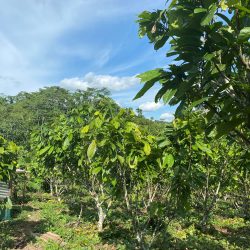Abuja, Nigeria – Nigeria is teetering on the precipice of an unprecedented humanitarian crisis, as a devastating confluence of climate change and unrelenting insecurity chokes its agricultural heartland and plunges millions into acute hunger. A grim new report from SB Morgen (SBM) Intelligence, titled “Nigeria’s Food Security Under Siege: Climate Change, Conflict, and the Collapse of Agricultural Resilience,” paints a chilling picture of a nation where the very act of feeding its populace is under siege.
The report, drawing data up to March 28, 2025, warns of dire repercussions not just for Nigeria, but for the entire West and Central African region, if immediate, drastic action is not taken. The figures are stark: in the first quarter of 2024 alone, an alarming 100 million Nigerians found themselves food-insecure, a dramatic leap from 66.2 million just a year prior.
This spiralling crisis is the direct result of a perfect storm: extreme floods and accelerating desertification are ravaging arable land, while escalating farmer-herder conflicts, widespread banditry, and rampant kidnappings have turned once-fertile fields into battlegrounds. The result is a dramatic decline in agricultural output, fuelling an alarming 35.41% food price inflation in January 2024 and deepening the humanitarian catastrophe.
Nature’s Wrath and Man’s Folly
The climate crisis is fundamentally reshaping Nigeria’s environmental landscape, directly impacting agricultural productivity. SBM Intelligence highlights the devastating floods that inundated 31 of Nigeria’s 36 states since July 2024, affecting approximately 1.2 million people and obliterating an estimated 180,000 cultivated farmlands. Borno State, between August and September 2024, bore the brunt, with widespread flooding exacerbated by the collapse of the Alau Dam, causing extensive damage and mass displacement.
Conversely, Nigeria’s northern regions are slowly being swallowed by the sands of time, with over 350,000 hectares of arable land vanishing yearly due to relentless desertification. These climatic shifts are not merely environmental curiosities; they are “threat multipliers,” transforming natural hazards into complex humanitarian crises by exacerbating existing conflicts and forcing mass displacement.
A Nation Under Siege
Beyond the environmental assault, a pervasive wave of insecurity has brought Nigeria’s food systems to their knees. The report details the brutal reality: insurgent attacks continue to plague the Northeast, while the Northwest is gripped by widespread ‘banditry’ and a relentless wave of kidnappings that makes farming a deadly gamble.
Perhaps most alarming is the alarming spread of the farmer-pastoralist conflict, traditionally concentrated in the Middle Belt, now reaching deep into Nigeria’s Southern States. What began as localised grazing disputes has metastasized into violent clashes involving sophisticated weaponry. Civilian non-state actors are now estimated to possess approximately 6.145 million small arms nationwide, dwarfing the state’s combined arsenal of about 586,600 firearms – a terrifying imbalance that fuels endless cycles of violence.
The regional impact is profound. The Northcentral “food basket” region, encompassing Benue, Plateau, and Nasarawa, remains the epicentre of pastoral conflict. Benue has endured over 200 documented attacks, and Plateau around 150 incidents between 2019 and 2025. In Nasarawa State, a mere 1% increase in human insecurity correlates to a staggering 17% decline in agricultural activities. Massacres, such as the December 2023 Bokkos atrocity (140 lives lost) and the January 2025 attacks in Mangu (30 killed), have directly devastated farming communities, leaving behind a trail of blood and barren land.
In the Northwest, banditry and kidnappings have led to the displacement of nearly 700,000 people in Zamfara alone, effectively crippling agricultural activities. The Northeast continues to grapple with insurgent attacks, a situation exacerbated by USAID funding freezes in early 2025.
The Spreading Scourge
The alarming southward creep of the pastoral conflict is a new and dangerous dimension. In February 2025, armed militias attacked Akure North LGA in Ondo State, resulting in 20 farmer deaths. Just last March, over 1,000 women in Enugu State protested persistent herdsmen attacks, bravely speaking out against sexual violence and widespread insecurity that has become their daily reality.
This pervasive insecurity has forced over 2.2 million Nigerians to flee their homes nationwide, including 1.3 million in the Northcentral and Northwest regions by April 2024. This mass displacement directly reduces agricultural output in some of the country’s richest farming areas, further tightening the noose of food insecurity. As of March 2024, a staggering 18.6 million Nigerians were facing acute hunger.
Inadequate Responses, Deep-Seated Problems
The Nigerian government has attempted to address these crises with initiatives like the National Livestock Transformation Plan (NLTP) and anti-open grazing laws, which 17 states have passed and 12 are actively enforcing. Military interventions such as Exercise Ayem Akpatuma and Operation Whirl Stroke have also been deployed.
However, the SBM report argues these efforts have been largely inadequate. The NLTP remains poorly implemented, and anti-open grazing laws face significant enforcement challenges and political resistance. A major criticism levied is the consistent failure to prosecute perpetrators of violence, which emboldens armed groups and perpetuates a culture of impunity. Deep-seated mistrust and the politicisation of the conflict along ethnic and religious lines further complicate any lasting resolution. The government’s approach, the report contends, is often reactive, relying on temporary military interventions rather than proactive, holistic strategies addressing root causes like climate change adaptation and land tenure reform.
The report concludes with an urgent plea: Nigeria is battling a severe and expanding dual crisis that fundamentally undermines its food security and threatens national stability. A coordinated, multi-faceted approach is no longer an option, but an imperative. Strategic recommendations include the widespread implementation of climate-smart agriculture programmes, focusing on drought-resistant and early-maturing crop varieties, and a significant investment in irrigation infrastructure. The pervasive failure to prosecute perpetrators indicates a deeper systemic breakdown requiring more than piecemeal solutions, emphasising the urgent need for integrated interventions addressing both environmental vulnerabilities and human-induced threats before the nation collapses under the weight of hunger and conflict.




